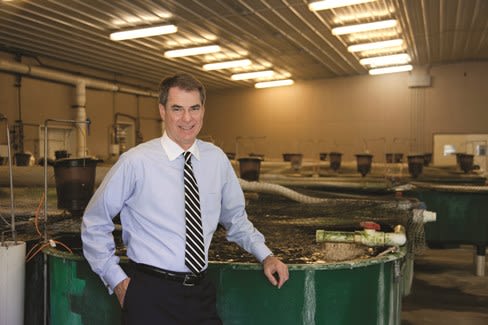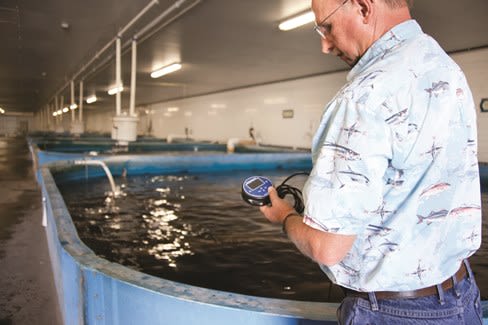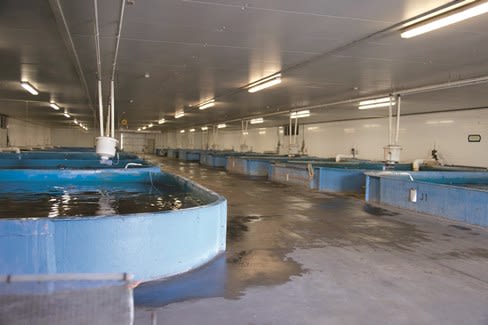Big Fish
Interview by Tony D'Souza
Photography by Matt Holler

“Sarasota is becoming a much better place to put capital to risk. You have people coming together, finally.”
SARASOTA AND MANATEE―AND ALL OF FLORIDA―rank low on the scale of attracting start-up capital, but one ambitious venture capital investment firm is showing that entrepreneurial talent and serious investors are in our back yard.
Seven Holdings, officially doing business as Southeast Venture Holdings, was founded in 2013 and has offices in Sarasota and Shreveport, La. It is headed by Sarasota entrepreneur Chris Cogan, 55, and investors Ross Barrett and Russ Vernon. The company set the Sarasota business community abuzz late last year with its first private equity acquisition: Mote Marine’s inland aquaculture business, primarily encompassing farm-raised Siberian sturgeon caviar, to be marketed under the “Healthy Earth” sustainable foods brand. (The terms of the deal are private because of a nondisclosure agreement.) Then, on Feb. 12, Seven Holdings acquired the Anna Maria Fish Company helmed by Seth and Mic Cripe and Ed Chiles of the Chiles Restaurant Group. (The terms of this deal were not disclosed, either.) Anna Maria Fish Company made headlines in The New York Times in 2013 for producing sustainable sun-dried mullet roe, called bottarga, a delicacy prized in haute cuisine. Cogan says these acquisitions underline “the sustainability of Sarasota’s marine economy”―or “blue economy.”
Seven Holdings’ partners also brought a dozen companies to the new venture, with an emphasis on life science, drug discovery and medical technology. The company manages about $40 million in venture capital and also has a consulting arm for companies they are interested in investing in.

Healthy Earth’s Jim Michaels checks dissolved oxygen levels at a sturgeon production tank.
By his own admission, Cogan could have retired at 24, after selling a wastewater utility operating company he founded at 18 in Orlando, where his father designed and built similar systems. “That put me through college and gave me the capital to start my next business,” Cogan says. He earned a B.A. in economics at Rollins College, completed the management program at Rollins’ Crummer Graduate School of Business, and attended the AEA/Stanford Executive Forum, all while building eight companies, six of which he sold for profit. He spun out NCR (formerly National Cash Register) government software systems in his late 20s as AT&T was acquiring the company, and three years later sold those same properties back to the telecom giant. Before launching Seven Holdings, Cogan was managing partner of the Bellwether Group at Morgan Stanley, with more than $600 million under management. Cogan’s wife, Aimee, also with Morgan Stanley, is included in Barron’s Top 100 Women Financial Advisors. The Sarasota power couple actively supports the Asolo Repertory Theatre and have a 7-year-old daughter, Caragh.
For now, Seven Holdings is focusing on sustainable foods, and it hopes to become a U.S. leader in that domain. Jeff Sedacca, president of the Shrimp and Aquaculture division of National Fish and Seafood, is a venture partner, and former U.S. Congresswoman Katherine Harris is the company’s managing director of investor relations. Cogan says the sustainable food initiative has a market value of about $60 million and about half a dozen investors. “We’ve been very selective about who we approached because we wanted to expand our domain expertise and we also wanted to make sure that the group all got along. We didn’t want to screw up the mojo in the locker room,” Cogan says. The fund’s past public venture shares required a $500,000 investment; Seven will soon launch a new $25 million capital raise focused on its “Healthy Earth” brand; investment will begin at $1 million.
That Seven Holdings is making major ripples in Sarasota was reinforced last summer when a document detailing the company’s ideas for developing a prominent city property adjacent to the Van Wezel was slipped under vice mayor Susan Chapman’s door and leaked to the Sarasota City Commission. A group called Bayfront 20:20, led by Virginia Haley and Michael Klauber, had been working to develop community consensus for a plan for the 42-acre property; Seven’s document, describing a major conference and hotel center and new Mote aquarium, offered a competing vision. Seven Holdings had included the Sarasota City seal on the document; Chapman and other city commissioners took heated issue with that. Cogan says that the use of the seal on the private document was not intended to suggest buy-in by the city. City Attorney Robert Fournier accepts that explanation. “Their document was intended to be illustrative, to show what a final plan could look like down the road,” he says.
Regardless, the damage was done, and at the July 21, 2014 city commission meeting, the commissioners voted 3-2 to exclude any convention center from being built on the property.
Cogan says Sarasota offers an exciting investment ecosystem that rivals the state’s major cities. We asked him about Seven Holdings, his local acquisitions and more.

Healthy Earth’s sturgeon production building.
Q: WHY DID SEVEN HOLDINGS ACQUIRE MOTE AQUACULTURE?
A: Global population is growing by about 75 million annually, equivalent to a Germany being added to the globe every year. We have to figure out how to feed all these people without breaking the environment. The only way to do that is through sustainable initiatives. Twenty years ago, it was foolish to make these investments [in aquaculture]. Now there’s so much that’s been well proven by institutions like Mote. It’s not a fad; it’s a trend. Seven Holding’s Healthy Earth foods will be the leader in the U.S.
Q: WHY DID MOTE WANT TO SELL?
A: Mote is a not-for-profit research institution. Their team has not built or run companies to profitability. It’s no discredit to Mote; they just have no idea what the market price of Siberian sturgeon caviar should be. John Elstrott, the chairman of Whole Foods, has been involved with our firm for over eight years [on the advisory board]; he’s very excited about this sector. Jeff Sedacca heads up one of the largest seafood companies in America, which is owned in part by one of the largest seafood companies in the world. Anybody can grow fish; we have the ability to sell it.
Q: WHY HAS KATHERINE HARRIS BEEN TRAVELING TO CHINA ON BEHALF OF SEVEN?
A: She just got back from Hong Kong, our second trip in the last two months. She was introducing Healthy Earth to a group of ultra-high-net-worth individuals. These people realize they’ve got problems. They realize the U.S. leads in food safety technology; it’s the No. 1 issue for them. They’re interested in seeing how we are doing it and using it as a model that can be replicated over there.
Q: YOU COULD INVEST YOUR MONEY ANYWHERE. WHY SARASOTA?
A: Sarasota is becoming a much better place to put capital to risk. You have people coming together, finally. You have Larry Thompson at Ringling [for example], doing phenomenal things with their digital media. You have Teri Hansen at the Gulf Coast Community Foundation and their BIG [Bright Ideas on the Gulf Coast] project that [volunteer] Dean Eisner [former CEO of Manheim] is helping to head up. You’ve got Bob Essner [former CEO of Wyeth], who’s run the largest pharmaceutical company in the world, willing to spend his time to help Mote and the companies it spins out. On Bird Key alone, there are probably three or four guys who have been on the executive committees of the largest pharmaceutical companies in America. You’ve got Ron Gelbman [Johnson & Johnson], Richard Nicolosi [Proctor & Gamble]. [They’re] willing to spend time, mentor companies. That’s what it takes, a venture ecosystem. Sarasota has something to offer in the Florida venture ecosystem; we have a plethora of these successful individuals.
Q: WHAT’S SO IMPORTANT ABOUT MENTORSHIP?
A: One of my greatest mentors was a guy in Orlando named Bill Grimm. He was head of Gray Robinson’s [corporate law firm] security and technology practices. Bill took almost all of the biggest technology firms in Florida public. I built two technology companies in Orlando that would not have reached the level of success in the time frame they did without him. Bill can tell a story about an angel investment group he was counsel for; they made nine investments that failed. Then they made a 10th investment―Sawtech―and it became a billion-dollar company. Bill told me, ‘Chris, the crazy part of it was six or seven of the other companies would have made it if they had had good mentors.’ Regardless of how good your technology is, if you don’t have somebody to open that door, you are going to fail.
Q: HOW DO YOU DECIDE WHAT TO INVEST IN?
A: We have a general concept or theme, do research and fine-tune it. Our sustainable food thesis came about through two or three years of full-time work and is consistent with folks on our team who have tremendous domain experience in sustainable, healthy, organic type food.

A juvenile Siberian sturgeon.
Q: WHAT HAPPENED WITH THE BAYFRONT 20:20 FLAP?
A: There was a colossal misunderstanding. Once our confidential plan was leaked to the public, we politely shelved it even though we had spent hundreds of thousands of dollars between ourselves and our partners. Gary Hoyt’s architectural firm had hundreds upon hundreds of hours into the planning; our partner firm in Arizona likewise had a tremendous amount of time invested. We decided to step back and allow the city and their chosen process to play its course. It’s ironic that the six guiding principles that were developed over the last six months are almost identical to the guiding principles in our plan. We were circumvented before we had a chance to go through the public process; people had their own motives and used us as sacrificial lambs.
Q: THIS PLAN INCLUDED A CONFERENCE CENTER/HOTEL BY MARRIOTT. DID MARRIOTT REALLY BUY IN?
A: Yes.
Q. ARE YOU LOOKING AT OTHER INVESTMENTS OUTSIDE OF SUSTAINABLE FOODS?
A: Not until this thing is off the ground successfully. ■
MOTE AQUACULTURE PARK, SITE OF HEALTHY EARTH (SEVEN HOLDINGS) CAVIAR OPERATION
FOUNDED 2001
LOCATION Fruitville Road, east of I-75
FACILITIES 125,000 square feet of freshwater and marine production facilities on 200 acres. Mote Marine Laboratory owns the facilities and land and runs the marine aquaculture research and development. Seven Holdings runs the freshwater sturgeon and caviar operation.
WHO THEY ARE Mote Aquaculture Park is the nation’s largest recirculating research facility for marine and freshwater aquaculture in the United States. It houses the sturgeon and caviar operation recently purchased by Seven Holdings for their brand Healthy Earth.
PRODUCTS Estimated 81,000 pounds of sturgeon meat and 1.8 metric tons of caviar in 2014
MARKET FOR STURGEON PRODUCTS Sold locally at Morton’s Market and at Whole Foods here and throughout the Southeast. Also found in high-end gourmet catalogues, such as Dean & DeLuca, and high-end restaurants, like the Ritz-Carlton, Sarasota.
HEALTHY EARTH CORTEZ LLC (FORMERLY ANNA MARIA FISH COMPANY)
FOUNDED 2007
LOCATION Gamble Creek, Parrish
FACILITIES 800-square-foot facility on a 26-acre organic farm
WHO THEY ARE Producer and developer of sustainable seafood, including bottarga, mullet fillets, smoked mullet, mullet caviar
BOTTARGA PRODUCTION 7,500 pounds estimated in 2015
BOTTARGA MARKET The majority is sold to a few high-end retailers and chefs, mainly outside the U.S., in Italy and Asia. Locally used by the Ritz-Carlton, Sarasota.

Packaged bottarga.